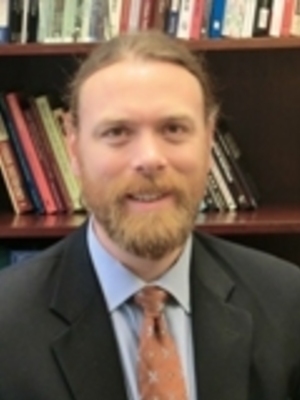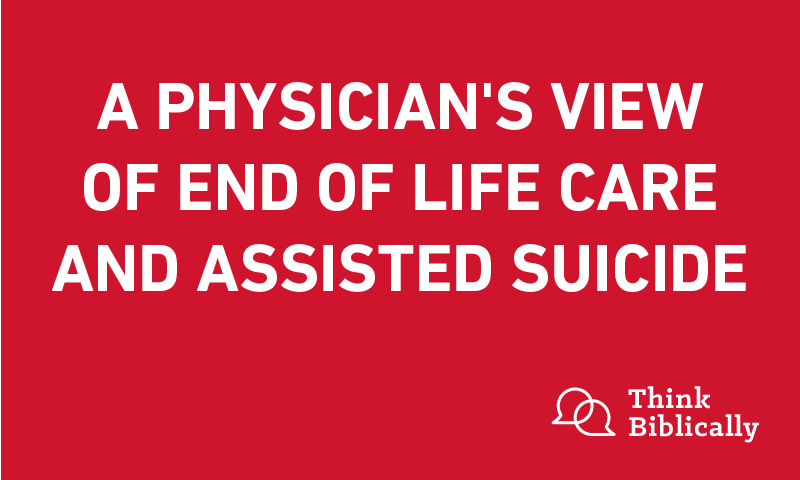Managing the end of life is challenging both for patients/families, and also for physicians. Join us as Scott interviews Dr. Ryan Nash, who has dealt with thousands of patients and families at the end of life as he shares his expertise on end of life care and assisted suicide.
More About Our Guest

Dr. Ryan Nash, MD, is Associate Professor of Medicine and Director of the Center for Bioethics and Medical Humanities at Ohio State University School of Medicine. He also serves as the Hagop S. Mekhjian, MD, Chair in Medical Ethics and Professionalism and he has a faculty appointment in the Department of Internal Medicine with ongoing clinical work in the Department of Palliative Medicine. Dr. Nash has a strong background in ethics and palliative care, researching how medicine, moral philosophy and moral theology impact patients with advanced and serious illness.
Episode Transcript
Scott Rae: Welcome to the podcast, Think Biblically: Conversations on Faith and Culture. I'm your host, Scott Rae, Dean of Faculty and Professor of Christian Ethics at Talbot School of Theology at Ĺ·˛©ÍřÖ·.
We're here with our guest today, Dr. Ryan Nash, who is a palliative care specialist physician and Director of Bioethics and Ethics Education at the Ohio State University Medical Center in Columbus, Ohio, one of his specialties being in palliative care, I think, makes him especially well qualified to talk to us about our subject today, which is assisted suicide and its impact on the practice of medicine. So Dr. Nash, also a native Texan, having grown up in Houston myself, is great. It's great to have you with us. Thanks so much for joining us.
Ryan Nash: Thank you, Scott.
Scott Rae: So tell me, just in general, how does your Christian faith inform your work as a physician and your work in bioethics?
Ryan Nash: Well, I think right now in medicine there's a lot of traction on a concept of moral distress and burnout, compassion fatigue. It's common. I think it's a misdiagnosis. What moral distress really is, was defined in war when soldiers were told to kill or drop napalm on this village, and it was something they knew was wrong and they had to do it under orders.
I don't think that's what nurses and doctors are experiencing. I think they're experiencing the reality of sin and death and suffering in the world, and it impacts their soul. For non-believing physicians or medical health professionals, it's hard for me to understand how they do what they do without faith. When we get seasick, we're to look to the horizon. If there's no horizon, you're just tossed to and fro.
Scott Rae: You're seasick all the time.
Ryan Nash: You're seasick all the time. So I think one thing that especially dealing with patients with advanced illness, without the hope of Christ, without the reality of the soul with that reality of what death brings, that it is our birth into the true life, if we're united with Christ, without that mooring, I don't know how one could be a physician.
There are challenges, and I think that leads to the second part of the question. The challenge is we're in a greatly disoriented medicine, really medicine that it's hard to say if it was ever really oriented in a truly Christian way, but it's obviously increasingly not Christian or even anti-Christian. That makes it difficult sometimes being a Christian believer. I'm an Eastern Orthodox Christian, but nonetheless, very much that's central in my life. So in doing medicine, sometimes I feel constrained that I can't do all the things that I'd like to.
Scott Rae: Like what?
Ryan Nash: I can be clear on the proscriptions. I'll never participate in assisted suicide and euthanasia. I would never participate in abortion. I would never participate in gender reassignment. I would never affirm sin as such, but prescriptively, I think the Christian faith can offer even more. I'm not saying that you cheaply proselytize someone who's suffering and dying, but proselytizing doesn't have to be cheap.
Scott Rae: Right.
Ryan Nash: Sharing the hope that's within us, sharing that there's a need for repentance, that there's a need for contrition, that the prayer on our lips as we die is to be "Lord, have mercy on me, a sinner," and that the reality of meeting God when we die, I often feel constrained by secular medicine that I can't share in greater abundance, and I think I do more than most.
My palliative fellows often will comment after I go into, with permission, I go into depth with my patients on their faith and how that's important to them, and I've had sessions where I'm prescribing psalms for them to pray, and my fellows, usually not Christians, are just stunned. "What is this?" But they can't find fault because I had permission, and that's the great secular ethical principle.
Scott Rae: So you're prescribing psalms on your prescription pad and writing it out in your non-legible physician's handwriting.
Ryan Nash: Now it's all in the computer. But sometimes I will make a little note, and I don't prescribe psalms. I don't want people to think I'm overly righteous, but things like that, if we look at the long history, the Christian tradition of medicine before the modern era, before the enlightenment, if we look at the unmercenary Christian saints, they healed with medicine, with the best medicine of the day, largely [inaudible] medicine. They had surgery. Not in the kinds of technology we have today, but they did heal using those more mundane means, but they also used prayer and liturgical rites and anointing and confession. Most of them were priests as well. Not all, but many were priests, and they'd heal even miraculously.
That's a history that's largely unknown in contemporary culture, but when I read those lives, I long for something that would be ... One of the questions I have in my scholarly work is "What is Christian medicine? What will it look like? How would it look different than a secular medicine?" The proscriptions are clear. We're not going to kill. But the prescriptions are harder. "How do we encourage those that are hurting to be united with Christ?"
Scott Rae: And give them real hope.
Ryan Nash: And give them real hope that we can bring them to the true healer without it just being a simple, cheap intellectual assent, that it'd be something that actually tangibly changes them. So how do I deal with bioethics? Well, I try to do it on both ways, at both levels.
We have this secular level where I want to be honest as I am a clinical ethicist and an ethics committee chair and the head of ethics for a secular public university, I describe bioethics as it is, professional standards, legal standards, community standards. I describe it as it is, and often if I'm doing a clinical ethics consult, I may be giving guidance saying it's, at that level, this modus vivendi, this way of life, the way a peace among disputing parties. I can describe what's common in the practice while foundationally I know there's more.
Scott Rae: Right.
Ryan Nash: Now I try to influence that modus vivendi. Don't get me wrong. Sometimes I feel duplicitous or schizophrenic in the true meaning, but I try to influence in ways subtle and not so subtle, but I engage doing bioethics at both levels. At one level, doing the ethics that is a law and policy and public and community standards, professional standards, and then longing for and arguing for a better ethic that's normative or foundational. So I try to engage both.
Scott Rae: Okay. Ryan, you're a palliative care physician which, for our listeners who aren't familiar with that term, means you're a pain management specialist.
Ryan Nash: Right.
Scott Rae: And you deal with a lot of people at the end of life who are dealing with pain, in particularly endstage cancers, things like that. How do you understand the Bible's teaching on the end of life and our obligation to patients at the end of their lives?
Ryan Nash: Well, the Bible, with medicine, is largely ... I think there's more corrections in medicine, more examples of this woman with a flow of blood spent all over money on physicians, or there's often medicine did this, and now you've come for true healing. But I don't think in the Christian tradition, medicine has not been assured. It is permissible. I do think it's optional in the contemporary standard.
If a Christian wanted to forego medicine, I think that would have to be done with spiritual counsel and guidance, and it needs to be assured that they're not doing it for selfish purposes or for being in the throes of despondency or depression. Even though death is a great consequence of sin, general sin, the acceptance of death and longing for life in Christ that were birthed into true life, Saint Ignatius of Antioch, when he's ...
This is someone who was taught by the apostle John, the theologian, contemporary Polycarp and Clement. When he was going to Rome to be martyred, he wrote to the Romans, the Christians in Rome and said, "If you can stop this, don't, because I'm about to suffer the birth pangs of life." He saw his death as birth pangs, a consequence of the fall, the birth pangs of entering the true life. This isn't some sort of Gnosticism. This is entering into true life. This life, this biological life where body and soul are one is in preparation for the birth pangs, which is death and the separation of soul and
 Ĺ·˛©ÍřÖ·
Ĺ·˛©ÍřÖ·